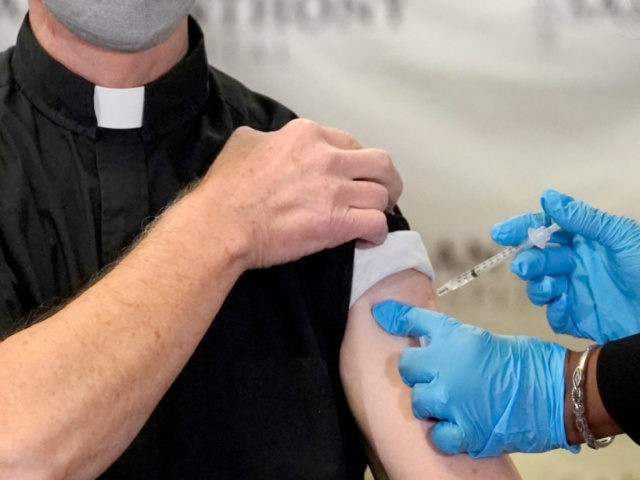A team of prominent Catholic scholars and bioethicists have published an analysis “to explain why it is morally acceptable for pro-life citizens to receive any of the COVID-19 vaccines currently available.”
In their analysis, published by the Ethics and Public Policy Center (EPPC), the scholars assert that the acceptance of any of the coronavirus vaccines currently on offer does not endorse or contribute to the practice of abortion, and nor does it show “disrespect for the remains of an unborn human being.”
“While there is a technical causal linkage between each of the current vaccines and prior abortions of human persons,” they state, “we are all agreed, that connection does not mean that vaccine use contributes to the evil of abortion or shows disrespect for the remains of unborn human beings.”
“Accordingly, Catholics, and indeed, all persons of good will who embrace a culture of life for the whole human family, born and unborn, can use these vaccines without fear of moral culpability,” they declare.
The scholars explain that common to the four major vaccines, produced by Moderna, Pfizer, Johnson & Johnson, and AstraZeneca, “is some use of ‘immortalized’ human cell lines.”
While cells taken from a body usually have a limited life span, undergoing only a fixed number of cell divisions before they die, for ongoing research, scientists prefer to use a “cell line,” or a population of cells derived from a single source that has been modified to divide indefinitely in culture, they note.
One of the more commonly used cell lines is called HEK293. “HEK” stands for “human embryonic kidney,” and “293” refers to the 293rd experiment conducted by the scientist who produced the cell line.
The scholars note that “all of the HEK293 cells available around the world today were derived from the remains of a single unborn child that was aborted a half a century ago,” adding that, importantly, “there is no ongoing use of aborted tissue to generate HEK293 cells, to modify these cells, or to maintain them in the laboratory.”
“Thus, the use of HEK293 (and similar immortalized lines) does not create future incentives for more abortions,” they state.
HEK293 cells are commonly used for testing processed foods produced by companies such as Kraft, Nestlé, Cadbury, and others, and the “majority of processed/packaged food products available for sale in the United States are likely to contain ingredients produced or tested in HEK293 cells,” they add.
Morally speaking, the analysis of the licitness of using a vaccine produced using this cell line in its manufacture or testing depends on the answer to two questions:
Do any of the vaccines make more use than others of the mortal remains of unborn children from whom the cell lines were derived? The answer is no; as a matter of scientific fact, no fetal “body parts” are present in these immortal cell lines. The immortal cell lines are artifacts—biological products that have been modified and reproduced many times over, and they do not retain the natural function of the tissue from which they were derived. They are not “body parts” in any meaningful or morally relevant sense.
Does the production and use of any of the vaccines contribute to, cooperate with, or promote any abortion? Again, the answer is no, for the abortions from which cell lines such as HEK293 were derived happened decades ago, and no further fetal tissue is used or needed for the maintenance of these lines.
The scholars note that vigorous condemnation of the apparently elective abortion that led to the derivation of the HEK293 cell line is in order because it involved the unjust taking of a human life.
At the same time, the HEK293 cell line and those like it “do not contain the remains of any human being and so its use does not show disrespect for human remains,” they state.
The scholars part ways from recent statements by U.S. bishops that one vaccine is morally preferable to another.
We think it “a mistake to say both that these vaccines are morally permissible to use and yet that some ought to be preferred to others,” they declare. “There appears to us to be no real distinction between the vaccines in terms of their connection to an abortion many decades ago, and thus the moral starting point is one of equivalence.”
“To be perfectly clear, we are not saying that people are justified in using and promoting these vaccines because the great goods they provide offset the evil of appropriating a prior wicked action,” they state. “Rather, we believe that there is no such impermissible cooperation or appropriation here.”
“The attenuated and remote connection to abortions performed decades ago and the absence of any incentive for future abortions offer little if any moral reasons against accepting this welcome advance of science,” they conclude.
The statement was signed by Ryan T. Anderson, Ph.D., President of the Ethics and Public Policy Center; Father Nicanor Pier Giorgio Austriaco, O.P., Ph.D., S.T.D., Professor of Biology and of Theology, Providence College; Maureen Condic, Ph.D., Associate Professor of Neurobiology, University of Utah; Father Kevin Flannery, S.J., Ph.D, Emeritus Professor of Philosophy, Pontifical Gregorian University; Robert P. George, J.D., D.Phil, D.C.L., D.Litt., McCormick Professor of Jurisprudence, Princeton University; O. Carter Snead, J.D., Professor of Law and Director of the de Nicola Center for Ethics and Culture, University of Notre Dame; Christopher Tollefsen, Ph.D., Distinguished Professor of Philosophy, University of South Carolina; Father Thomas Joseph White, O.P., D.Phil., Professor of Systematic Theology, Pontifical University of St. Thomas Aquinas – Angelicum.

COMMENTS
Please let us know if you're having issues with commenting.